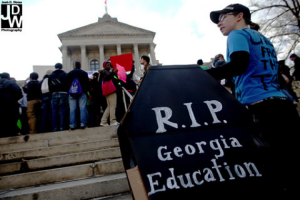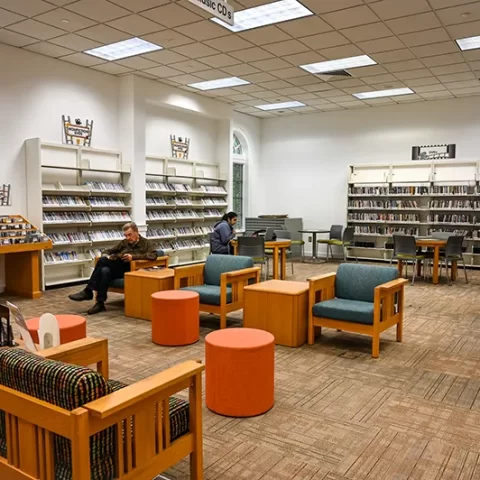
By: Cait Felt
As the state of Georgia plunges into the next gubernatorial race, it is becoming increasingly apparent to voters on all sides that this election will be decided by a topic left relatively untouched by past candidates— the future of our public schools. Political campaigns are built on a history of relying on specific hot-topic issues to define that particular election. Candidates in question will normally choose one specific issue that they believe they can use to their best advantage and try a much as possible to get the media and voters to focus on their superior platform throughout the race. Occasionally, two opposing candidates will choose the same issue to butt heads around for the months preceding their election, or the repeated focus by one candidate will force the hand of their opponent, as seems to be the case this year.
Democratic candidate Jason Carter has mentioned education as one of his three most important issues, and the lynchpin that holds his other two (economy and ethics) together for the future. Almost every promotional piece from Carter’s campaign mentions his staunch support for public education and his recent televised response to the Republican Gov. Nathan Deal’s State of the State address was almost exclusively a rebuttal of the Governor’s statements on Carter’s own education plan. Current State Senator Carter (who has been in office since 2010 and has quickly become a favorite among his constituents) made the bold suggestion of having two completely separate state budgets, where one is only for education expenses. He also said that this new budget would take precedent over funding all other state expenses, including his own potential office.
Carter has previously voted “no” on allowing vouchers (a subsidy system for students to attend private schools, which Carter argues would only weaken public schools) for students and for public funding of charter schools. He claims a staunch support of the public school system in the state of Georgia and promises to improve the state of this program if elected. He often uses his wife Kate, a public school teacher, and his two children, both enrolled in public schools, as evidence of his understanding of the problems with the system and solutions that could be presented to improve them. He has pointed out disappointing statistics on the rankings of Georgia’s public school system (Georgia’s school system earned only a C- in the latest rankings published by the Atlanta Journal Constitution), and commented on the general failure of the system to ensure a quality education for all students without the negative interference of a government economy problem under Gov. Deal.
The incumbent Gov. Deal, on the other hand, has historically placed much less emphasis on education reform in his campaigns, instead choosing to focus mainly on issues such as job building and stricter immigration policy. He has recently, however, been forced to focus a bit more on the issue in order to keep up with his opponent. In his record as a U.S. Representative for Georgia, he voted for many of the issues that Carter’s platform is against, including charter schools, student vouchers, and as Governor supported these issues as well as multiple increases in teacher furlough days when faced with a difficult state budget. He anticipated Carter’s focus in his State of the State address last week and spent a greater amount of time on the issue than any previous address he has given. He also made bold promises, some of which even directly contradicted his previous votes and actions in a political capacity. The Governor promised to eliminate teacher furloughs and reintroduce a large amount of lost funding to the public education system, but did not mention his continued support of vouchers and charter schools.
There is no doubt that the issue of education reform will greatly influence the outcome of Georgia’s November 2014 gubernatorial race, in a state where a relatively large percentage of registered voters are employed by the education industry and virtually every person is in some way impacted by the public education system, whether directly or indirectly, but how much will this election really impact education? The candidates in this race have done a spectacular job of bringing education reform to the forefront of voters’ minds, and both have made cogent arguments for their own sides. Both Deal and Carter seem extremely invested in the funding and improvement of Georgia education, but is there any way to tell if these are just empty campaign promises or sincere responses by these two men to the education crisis taking place in our state?
Another subject in education reform that the two candidates differ in opinions on is the HOPE and Zell Miller Scholarship. Gov. Deal has been quoted saying that his reform with the elimination of the income cap on the HOPE Scholarship was his most significant piece of legislation from his first term in the Governor’s Mansion. Carter, as State Senator, led a charge to reinstate this cap in light of the drastic overspending by the budget for this scholarship. The related Zell Miller Scholarship is not mentioned in either platform. Carter has also mentioned the need for increased funding to public universities, particularly in areas impacted by the Science, Technology, Engineering, and Mathematics (STEM) program. Deal has only responded by citing grants given to research universities such as the University of Georgia and the Georgia Institute of Technology throughout his terms.
Public school teachers, students, and politicians are all waiting with baited breath until the aftermath of the coming election to find out for sure, but what is certain is that something will have to change soon to satisfy the state after this educationally charged election season. It is yet to be seen the real impact that will be had on education in our state, but this election is sure to be remembered as an important one for the future of Georgia students.

